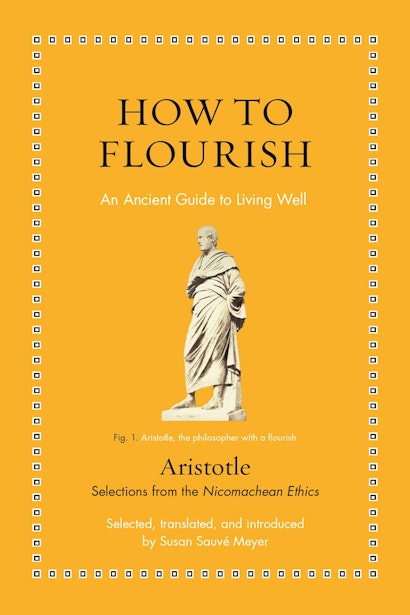There was no social media in Aristotle’s day. Social interactions were face to face, unmediated by technology. But a trio of virtues Aristotle invokes for social situations—and their corresponding vices—nicely capture the landscape of human (mis)behavior on the social media of today.
Do you tell the truth about yourself, or are you a braggart? In Aristotle’s example, you can be a braggart by wearing Spartan dress if you don’t also live a Spartan lifestyle. That’s a fourth-century CE version of virtue signaling. Does your Instagram feed give the impression that your life is more glamorous, your clothing more stylish, or your children more accomplished than they really are? That’s technologically mediated bragging, but bragging nonetheless.
While technology has increased the opportunities for engaging with other people, our incessant concern with how others perceive us has not changed. Even if we are not consciously jockeying for position, we are aware at some level of the level of esteem or regard others have for us. A braggart is someone who tries to garner more of this regard than is supported by the facts—a vice of excess in Aristotle’s terminology. But it isn’t good to sell yourself short either, by pretending to be less successful than you are. That would be the corresponding vice of deficiency.
Avoiding these two extremes is a delicate matter, requiring judgement and discernment. It is not simply a matter of not telling lies, since I’m assuming that everything in your Instagram feed is true. The problem is that it omits some less-flattering truths, if you are a braggart, or some flattering truths, if you have the opposing vice. Nor can you simply follow a policy of full disclosure: oversharing is another vice of excess. It is not easy to be good, and advances in technology are no help here.
The second social virtue in the trio is a good sense of humor. You don’t have to be adept at telling jokes in order to have this virtue. What you need are appropriate filters about what you will joke about or how you will respond when someone else has told a joke that is offensive or indecent. Joking of the sort Aristotle has in mind (skōptein) is transgressive, even at some level abusive: a joke at someone’s expense. Joking about someone is the opposite of taking them seriously or treating them with respect. So, when you laugh at a joke, you are in a sense taking pleasure in an attack on (or a put-down of) someone else.
Described in these terms, joking sounds like an anti-social activity, but Aristotle recognizes it as one of the pleasures we get from the company of others. Even if society is fundamentally a cooperative project that depends on a level of mutual respect, he recognizes that there is an adversarial element to the texture of even healthy social relations—a certain rough and tumble. Of course, this can be taken to extremes: there are jokes that are inappropriate in their content, their object, their occasion, and their audience. That is why Aristotle says there is a virtue in this domain, as well as all kinds of ways a person can go wrong. Social media only increases our exposure to this risk.
Social media also amplifies the stakes at issue in the final social virtue in Aristotle’s trio, sometimes called friendliness. Aristotle tells us that this virtue concerns how we engage (homilein) with other people in social contexts, using a verb that can also be used to describe engagement with an enemy in battle. Some shades of the latter meaning are operative even in its application to social contexts, evoking the give-and-take of conversation and other informal group activities. Sometimes what we say or do meets with support and approval (which we enjoy), but sometimes we get push back or opposition from others (which we find unpleasant). Delivering “likes” on social media or participating in a twitter pile-on are technologically amplified versions of these two responses, allowing us to deliver approval and disapproval remotely, often anonymously, and at scale. But the underlying human psychology that responds to this treatment remains the same: we enjoy being approved by others, and we find disapproval unpleasant.
According to Aristotle, we should care about being friendly and pleasant to others and about sparing them pain, but there can be both excess and deficiency in this endeavor. We are ingratiating if we go to excess in “praising everything [the other person says] … and objecting to nothing” and are disagreeable if we “oppose everything.” A virtuous person will strike the mean between these two extremes and will go along with, or oppose, the other person according to what is appropriate in the circumstances.
Now striking the right balance between being “too friendly” or not friendly enough is not always an easy matter, and the same goes for knowing how to respond to an offensive joke and how to avoid self-aggrandizing behavior. These concerns will also intersect with each other in complicated ways, since refusing to laugh at someone’s joke is bound to be unpleasant to the teller of the joke, and taking it upon oneself to call out an offense, or doing so in an inappropriately public manner, may itself be a form of self-aggrandizing behavior, and so constitute bragging (“virtue signaling”). Participating in mob justice, even if it takes place online, may itself be an act of injustice.
The Aristotelian moral here is that meting out approval and disapproval appropriately to fellow citizens requires more than a simple “moral compass.” You need a significant level of self-knowledge, discernment, and judgment. Aristotle’s name for this constellation of cognitive virtues is phronesis, which I translate as “good judgment.” It is a famous doctrine in Aristotle’s theory of virtue that you are not a good person unless you exercise good judgment.
Susan Sauvé Meyer is professor of philosophy at the University of Pennsylvania and a specialist in Greek and Roman philosophy. Her books include Ancient Ethics: An Introduction and Aristotle on Moral Responsibility. More than 100,000 people around the world have enrolled in her open-access online courses on ancient philosophy.

